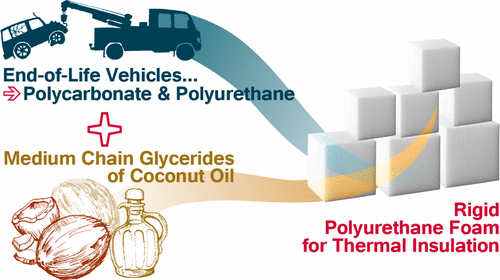Turning car plastics into foams with coconut oil

End-of-life vehicles, with their plastic, metal and rubber components, are responsible for millions of tons of waste around the world each year. Now, one team reports in ACS Sustainable Chemistry & Engineering that the plastic components in these vehicles can be recycled with coconut oil and re-used as foams for the construction, packaging and automotive industries.
Recycled polycarbonate (PC) and polyurethane (PUR) are ideal for building insulation, refrigerators, cushions and packaging products. But it can be challenging for plastic car components to get to that point. Some plastic wastes from vehicles can be easily reprocessed; however, PC and PUR materials require a more arduous chemical recycling method. In addition, paints and coatings on PC and PUR plastics from cars typically interfere with the process, causing the recycled product to deteriorate. And simply adding some types of recycled PC and PUR materials to existing insulation foams, for example, can make the foams too dense or brittle. Although researchers have developed various chemical recycling techniques, very few have tried to make useable products with them. Hynek Beneš, Aleksander Prociak and colleagues wanted to take a new approach to converting PC and PUR into recycled materials, with the hopes of increasing their applications.
The researchers previously had shown that coconut oil could degrade PC. Here, the team developed a way to recover PC and PUR from waste car plastics with coconut oil and microwaves. This created a renewable and recycled product that did not degrade. This product can be combined with an existing foam and the integrity of the insulation foam is maintained. Furthermore, this new material was stable at high temperatures, making it ideal for incorporation into insulating materials for the construction industry.
More information: Aleksandra Paruzel et al. Rigid Polyurethane Foam Fabrication Using Medium Chain Glycerides of Coconut Oil and Plastics from End-of-Life Vehicles, ACS Sustainable Chemistry & Engineering (2017). DOI: 10.1021/acssuschemeng.7b01197
Abstract
Polycarbonate and polyurethane scraps from end-of-life vehicles were converted into liquid recycled polyols with hydroxyl number around 300 mgKOH·g–1 by using medium chain glycerides of coconut oil. The obtained polyols were used for preparation of low-density rigid polyurethane foams. It was found that up to 50 wt % of the virgin petrochemical polyol can be replaced by the recycled polyols without any negative effect on the foaming process. The obtained foams exhibited the apparent density of 40–44 kg·m–3, the homogeneous cellular structure with a high content of closed cells (>91 vol %) and the beneficially low value of lambda coefficient (∼23 mW·m–1·K–1). The exceptionally high compressive strength (>350 kPa in parallel to foam rise direction) of the rigid PUR foams with 50 wt % of recycled polyol derived from polycarbonate scrap resulted probably from the unique structure of recycled polyol combining rigid aromatic segments together with flexible coconut oil glyceride units. In conclusion, this approach utilizing the renewable coconut oil-derived reagent provides a sustainable recycling solution for two major plastics from automotive waste.
Provided by American Chemical Society




















